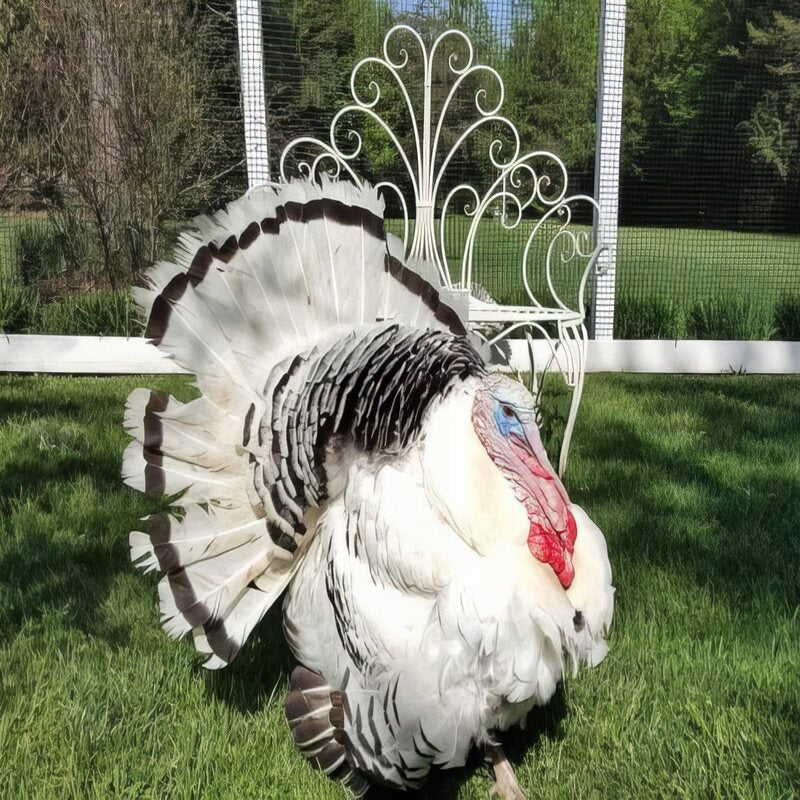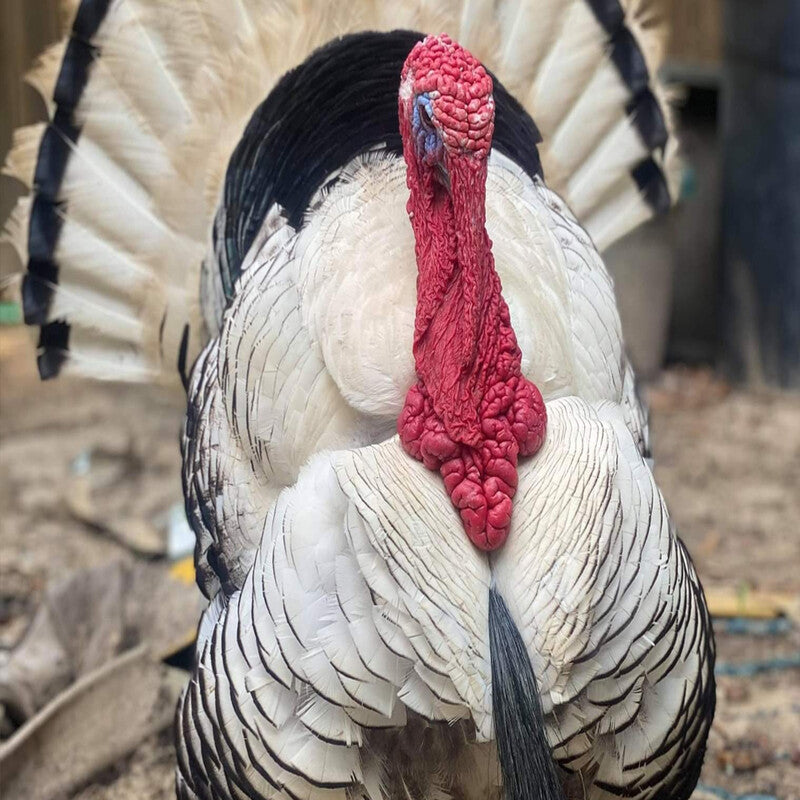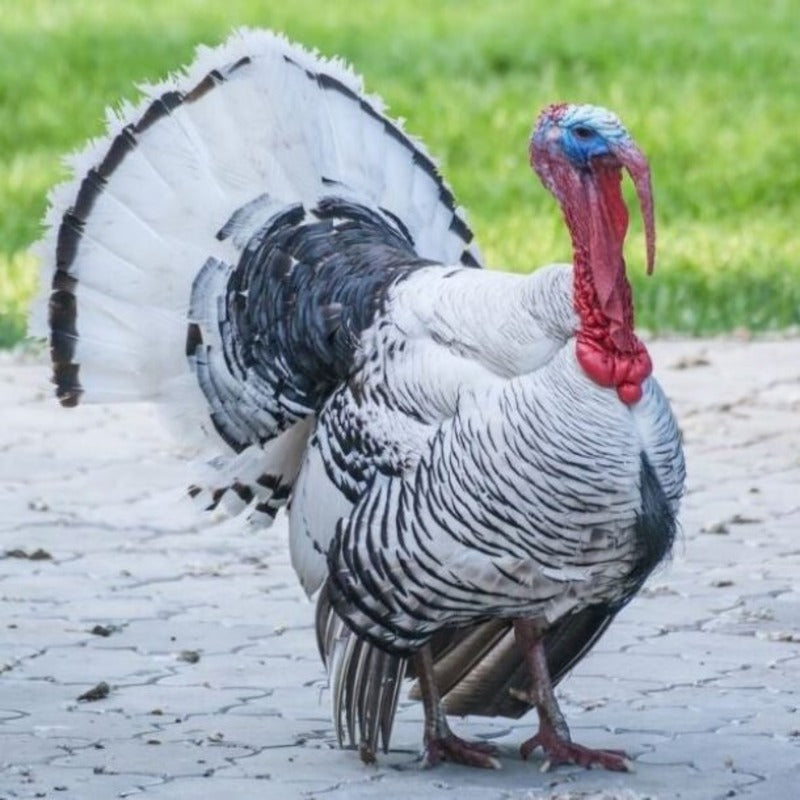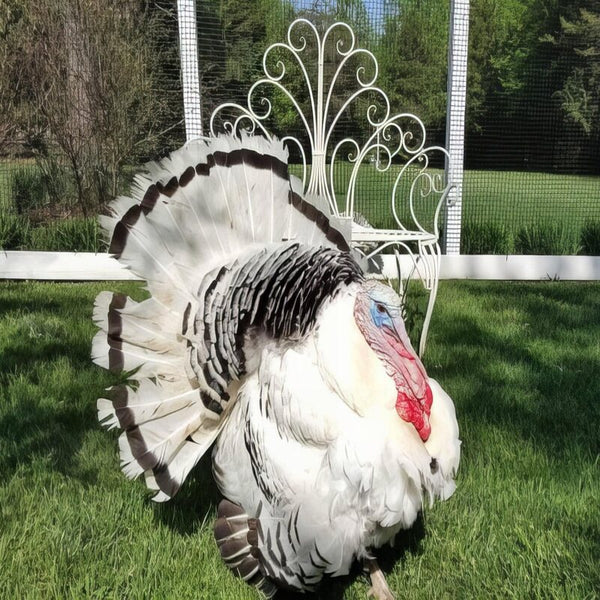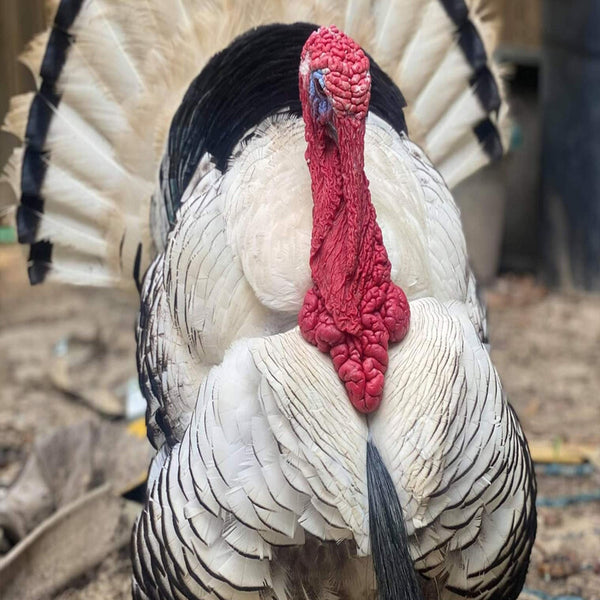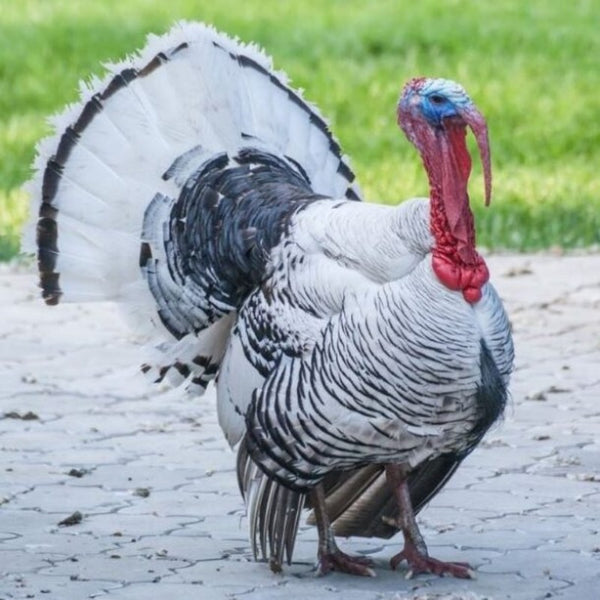Royal Palm Turkey
Royal Palm Turkey
The Royal Palm Turkey is a rare heritage breed, recognized by the American Standard of Perfection in 1977. Slightly smaller than other heritage turkeys, this beautiful bird is known for its striking color pattern and its natural ability to fend for itself.
Royal Palm turkeys are highly useful around the farm, especially for reducing insect populations. These turkeys are capable of natural breeding and often go broody, making them an excellent choice for sustainable poultry keeping. Order your Royal Palm turkeys today, and enjoy a hardy, attractive addition to your farm!
Appearance:
-
Feather Color: The Royal Palm Turkey has a beautiful plumage pattern. The feathers are white with black markings around the wings, tail and back. The contrasting colors make for a spangled effect which gives the bird a regal look. The toms have more pronounced black markings than the hens but both have the white and black coloration.
-
Body Type: The Royal Palm Turkey has a medium sized body which is smaller than commercial breeds like the Broad Breasted White. But it’s still well proportioned with a broad chest, sleek body and a graceful shape. It’s known for its compact and balanced body making it more manageable in smaller flocks or homesteads.
-
Head and Beak: The Royal Palm Turkey has a small head with a prominent snood (the fleshy thing over the beak) which is often red and can lengthen during mating displays. The wattles are also red and hang down from the neck. The beak is small and sharp for pecking and foraging.
-
Legs and Feet: The legs of the Royal Palm Turkey are yellow and short and strong enough to support the body. The feet are sturdy but not as heavy as the larger commercial breeds.
-
Tail: The Royal Palm Turkey has a fan shaped tail which is a characteristic of the breed. The tail feathers are long and graceful and often display a striking contrast between the white feathers and the black markings which adds to the bird’s royal look.

Temperament:
-
Calm and Friendly: The Royal Palm Turkey is calm and friendly. Unlike some other turkey breeds that can be flighty or aggressive the Royal Palm is gentle and easy to handle. This makes them an excellent choice for families, small farms or homesteads where they will be interacted with regularly.
-
Curious and Intelligent: The Royal Palm Turkey is also curious and intelligent. They like to explore and forage for food. While they are not as active as some other heritage breeds they are still fairly lively and can roam in free range environments.
-
Free Range: The Royal Palm Turkey is good for free range where they can roam and forage for food. They are naturally inquisitive and like to peck at insects, seeds and plants. They are less flighty than other breeds and get along well with other poultry.
-
Not Highly Aggressive: They are not aggressive towards other turkeys or animals so are easy to integrate into a mixed flock. They do well in flocks with other chickens, ducks or turkeys and are rarely territorial.

Meat Production:
-
Medium Size: The Royal Palm Turkey is a heritage breed that is smaller than commercial breeds like the Broad Breasted White. Males (toms) weigh 15-25 pounds and females (hens) 8-12 pounds. Although smaller they still produce high quality tender meat especially from the breast.
-
Flavorful Meat: The meat of the Royal Palm Turkey is flavorful, tender and juicy. It has a more traditional turkey flavor than commercially raised turkeys which often have a milder taste. The breast meat is lean and tender and great for roasting or other cooking methods.
-
Slow Growth Rate: As a heritage breed the Royal Palm Turkeys grow slower than commercial turkeys. They reach market weight in about 24-28 weeks. While this slower growth rate means they are not as efficient for commercial meat production it contributes to the rich flavor of the meat.
Health and Care:
-
Hardy and Adaptable: The Royal Palm Turkey is a hardy and adaptable breed. They can handle various climates and are less prone to the health problems that can affect more commercially bred turkeys. Their natural hardiness makes them a good choice for small farms or homesteads that may not have access to advanced poultry care.
-
Low Maintenance: These turkeys are relatively low maintenance compared to other breeds. They don’t require special diets or conditions and will stay healthy as long as they are provided with basic care such as clean water, good food and protection from predators.
-
Watch for Health Issues: Like all turkeys the Royal Palm Turkey should be watched for common poultry health issues such as mites, lice and coccidiosis. Regular health checks and a clean living environment are key to their health.
Housing:
-
Space: The Royal Palm Turkey does well in free range but can also do well in spacious housing. A secure shelter with room to move is important. They should have access to both indoor shelter for resting and outdoor areas for roaming and foraging.
-
Protection from Predators: Since Royal Palm Turkeys are not aggressive and are calm they need secure housing to protect them from predators especially at night when they may be more vulnerable.
Show and Ornamental:
-
Poultry Shows: The Royal Palm Turkey is a favorite in poultry shows due to its beautiful feather pattern, elegant posture and calm temperament. Their white and black feathering and fan tail make them a popular choice for exhibition and are often seen in heritage breed shows.
-
Ornamental Value: Because of their striking appearance the Royal Palm Turkey is also highly valued as an ornamental bird. Their beautiful plumage and docile nature make them a lovely addition to any farm or backyard flock. These turkeys are often raised for their beauty rather than for meat but still produce excellent meat.
Frequently Asked Questions:
What is a Royal Palm Turkey?
A rare heritage turkey with a beautiful color pattern, admitted to the American Standard of Perfection in 1977.
How big do Royal Palm Turkeys get?
They are slightly smaller than other heritage turkey breeds.
Are Royal Palm Turkeys good for insect control?
Yes, they are very effective at reducing insect populations on the farm.
Can Royal Palm Turkeys breed naturally?
Yes, they are capable of natural breeding and often go broody.
Where can I buy Royal Palm Turkeys?
Available from specialized breeders and hatcheries—order yours for a sustainable farm addition!
Royal Palm Turkey Facts
- Poultry Show Class: Turkeys
- Weights: Hen—–10 lbs
- Tom—-16 lbs
- Purpose and Type: Laying Eggs; Exhibition
- Egg Color: Off White with brown specks
- Egg Production: Poor
- Egg Size: Large to Extra Large
- Temperament: Active
- Fertility Percentage: 60-75%
- Broody: Setters
- Mating Ratio:: 7 Females to 1 Male
- Roost Height: 2+ feet
- Country of Origin: North America
- APA: Yes, Recognized by the Standard of Perfection in 1977
- TLC: Watch Status, considered a Sustainable Heritage Turkey Breed.
- Breeder Farm Source: Poultry Breeding Farm developing our bloodline or strain of pure Royal Palm Turkey Breed since 1976.
Notice: We do not sell items on Amazon or other websites.



